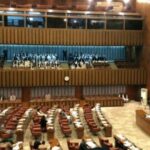ISLAMABAD Nineteen members of the federal cabinet were sworn in on Monday by President Asif Ali Zardari, who mixed youthful and seasoned actors in the process.
A few surprises arise in the distribution of portfolios: banker and former head of HBL Muhammad Aurangzeb has been appointed to head the government’s finance team, while Ishaq Dar, a four-time finance czar, has been chosen foreign minister.
Minister of State Shaza Fatima Khwaja is the only woman in the government; she has not yet been given a portfolio. Attaullah Tarar has been appointed as the coveted minister of information.
Prime Minister Shehbaz Sharif presided over the federal cabinet’s first meeting shortly after the oath-taking ceremony, during which the government decided to try to help the average person.
In addition, upon his oath of office as a minister, the cabinet meeting granted Mr. Aurangzeb’s request for Pakistani citizenship. The former banker was originally a Dutch national.
Azam Nazeer Tarar (law, justice, and human rights), Riaz Hussain Pirzada (housing and works), Musadik Malik (petroleum and power), Ahsan Iqbal (planning, development, and special initiatives), Khawaja Asif (defense, defense production, and aviation), and Rana Tanveer Hussain (industries and production) are the prominent PML-N figures making a comeback.
Two other members of the previous caretaker group have also been accommodated: former minister Ahad Cheema (economic affairs and establishment division) and former chief minister of Punjab, Mohsin Naqvi (interior and drug control).

Other members from the eight parties accommodated in the 19-member cabinet are PML-Q’s Chaudhry Salik Hussain (human resource development and overseas Pakistanis), Istehkam-i-Pakistan Party President Abdul Aleem Khan (privatization and Board of Investment), and MQM-P leader Khalid Maqbool Siddiqui (science, technology, federal education, and professional training).
However, so far, the PPP, PML-Zia, National Party (NP), and Balochistan Awami Party (BAP) have opted not to participate in the cabinet.
For the first time, a seasoned MNA from Chiniot named Qaiser Sheikh has been added to the cabinet and assigned the maritime affairs ministry.
Railways chief Sardar Awais Leghari has been handed the ministry, while former Balochistan chief minister Jam Kamal Khan has been assigned to the trade sector.
Amir Muqam, the leader of the PML-N KP, has been tasked with overseeing states and frontier regions, in addition to national heritage and culture.
Cabinet gathering
During the first meeting of the cabinet that followed, Prime Minister Shehbaz emphasized the significant economic obstacles that his government would have to overcome. He stated that controlling inflation and food prices would be the new government’s first task, particularly during the upcoming holy month of Ramadan, which begins on Tuesday.
He underlined, assuring the provinces of assistance, “I will not tolerate any kind of disturbance in the prices of commodities in the federal territory.”
He emphasized the necessity of closely observing how various food items are distributed as part of the Rs. 12 billion Ramazan package.
He noted that “on the one hand, the rich control over 90% of the country’s resources, but on the other hand, the common man is being crushed under the burden of a price hike” and urged the wealthy to contribute to the success of the country.
PM Shehbaz expressed concern over the annual loss of over Rs. 500 billion due to electricity theft and questioned the affluent classes’ subsidies, calling it the largest paradox.
He added that the power and gas industries’ combined circular debt had gotten out of hand.
Speaking of the exorbitant cost of electricity brought on by the operation of “junk plants” that burn diesel and lose billions of dollars, he declared: “Different mafias involved in this cycle should be dealt with.”
The prime minister also emphasized the need to close loopholes that allowed for tax evasion and to strengthen the tax net without burdening law-abiding taxpayers.
Additionally, the prime minister referred to the Special Investment Facilitation Council (SIFC) as an efficient tool for enhancing the nation’s investment climate by reducing red tape and severe delays.








